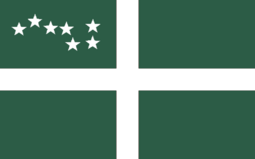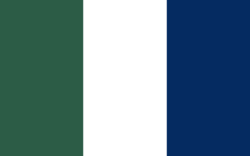User:Luziyca/Sandbox
This article is incomplete because it is pending further input from participants, or it is a work-in-progress by one author. Please comment on this article's talk page to share your input, comments and questions. Note: To contribute to this article, you may need to seek help from the author(s) of this page. |
 | |
| Use | National flag |
|---|---|
| Proportion | 5:8 |
| Adopted | 1916 |
| Design | A centred white Tyrnican cross on a Rythenean green field with the Big Dipper on the TBD |
The flag of Surrow is the national flag of Surrow. Designed in 1897 by Ervin Suchet, it was adopted in 1916 after Surrow gained full self-government from Rythene by the Surrowese Parliament the previous year over Joerg Angstroem's tricolor, and has maintained its status as Surrow's official flag ever since.
Design
The flag is comprised of a centred white Tyrnican cross on a Rythenean green field, with the Big Dipper on the canton.
When the flag was designed by Ervin Suchet in 1897, the flag was made similar to the Rythenean flag of that time, with Suchet declaring in a pamphlet which saw the flag be distributed that the green was to "symbolise our islands' indisputable Rythenean heritage," white "for the purity of the souls who inhabit this far northern land," and the Big Dipper "representing our land being the closest to the North Pole." Suchet did not include any red in the flag design as he claimed that "no Surrowese blood has ever been spilled in any war."
However, per the Constitution of Surrow, the green is meant to symbolise Surrow's tuckamore forests that cover much of Holcot Island, the white is meant to symbolise the long winters that Surrow experiences, and the Big Dipper is meant to represent Surrow's geographic position as the northernmost nation of Maurceania Major.
Historic flags
Colonial ensign
- probably red ensign or white ensign until 1824/25, then a green ensign until 1916 with the Rythenean flag on the hoist
Surrowese Tricolor
In 1887, Joerg Angstroem designed a green-white-blue tricolor for the Fishermen's Protective Union as a party flag. According to Angstroem, green was meant to represent the Rythenean population, white was meant to represent Surrow's long winters, and blue was meant to represent the Tyrnican population, with Angstroem seeing the colonial ensign used by the Surrowese government at the time as being "too Rythenean to be accepted by a sizable portion of the Surrowese population."
Angstroem's flag became popular, with the flag being extensively promoted by the Fishermen's Protective Union throughout the late 1880s and early 1890s. By the mid-1890s, the Surrowese Tricolor became a popular flag, especially among Surrow's Tyrnican population. However, its rise in popularity among the Surrowese Tyrnican population led to a decline in the flag's popularity among Surrow's Rythenean population, especially in the context of the then-ongoing Surrowese language question, with ethnic Rytheneans trending towards flying the colonial ensign, or towards Suchet's flag. This led to the Fishermen's Protective Union changing its flag in 1896 from the tricolor to a blue banner with a white fish.
With the outbreak of the First Great War in 1908, the colonial government banned the Surrowese tricolor as the colonial government feared that the flag could be used by "traitors who seek to bring Surrow back under the Tyrnican yoke." Although the flag was relegalized in 1913 after Tyrnica negotiated a separate peace with the Coalition, high levels of anti-Tyrnicanism at the time meant that the Surrowese Tricolor was not adopted by the Surrowese government in 1916, and the flag largely fell into disuse until the mid-1940s, when the Independence League adopted the flag and used it to promote Surrowese independence, with leader Todd Lester proposing that the flag be adopted as the flag of an "independent Surrow."
However, Ted Fisher's decision to keep the current Surrowese flag led to the Surrowese Tricolor falling back into disuse. The Surrowese Tricolor would only see a revival in the mid-1980s, with Deacon Parker's administration encouraging its use as a "secondary Surrowese flag," with a particular focus on touristic areas. Since then, the Surrowese Tricolor has become more popular, particularly in and around Holcot Inlet and Tern Harbour.
